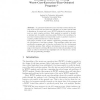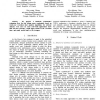RTS
2002
14 years 5 months ago
2002
The purpose of this paper is to introduce frameworks based on data-flow equations which provide for estimating the worst-case execution time (WCET) of (real-time) programs. These f...
EUROPAR
2010
Springer
14 years 6 months ago
2010
Springer
In the age of Grid, Cloud, volunteer computing, massively parallel applications are deployed over tens or hundreds of thousands of resources over short periods of times to complete...
ECRTS
2010
IEEE
14 years 6 months ago
2010
IEEE
Embedded control systems with hard real-time constraints require that deadlines are met at all times or the system may malfunction with potentially catastrophic consequences. Sched...
CODES
2007
IEEE
14 years 9 months ago
2007
IEEE
For the worst-case execution time (WCET) analysis, especially loops are an inherent source of unpredictability and loss of precision. This is caused by the difficulty to obtain sa...
RTSS
1996
IEEE
14 years 10 months ago
1996
IEEE
The well-known periodic task model of Liu and Layland 1] assumes a worst-case execution time bound for every task and may be too pessimistic if the worst-case execution time of a ...
EMSOFT
2003
Springer
14 years 11 months ago
2003
Springer
Abstract. To guarantee timeliness in hard real-time systems the knowledge of the worst-case execution time (WCET) for its time-critical tasks is mandatory. Accurate and correct WCE...
EMSOFT
2004
Springer
14 years 11 months ago
2004
Springer
We present a technique to approximate the worst-case execution time that combines structural analysis with a loop-bounding algorithm based on local induction variable analysis. St...
SEUS
2005
IEEE
14 years 11 months ago
2005
IEEE
In the last years the number of electronic control systems has increased significantly. In order to stay competitive more and more functionality is integrated into more and more p...
ASPDAC
2006
ACM
14 years 11 months ago
2006
ACM
- We propose a hardware performance estimation flow for fast design space exploration, based on worst-case execution time analysis algorithms for software analysis. Test cases on s...
RTAS
2006
IEEE
14 years 11 months ago
2006
IEEE
The evolution of battery technology is not being able to keep up with the increasing performance demand of mobile embedded systems. Therefore, battery life has become an important...


